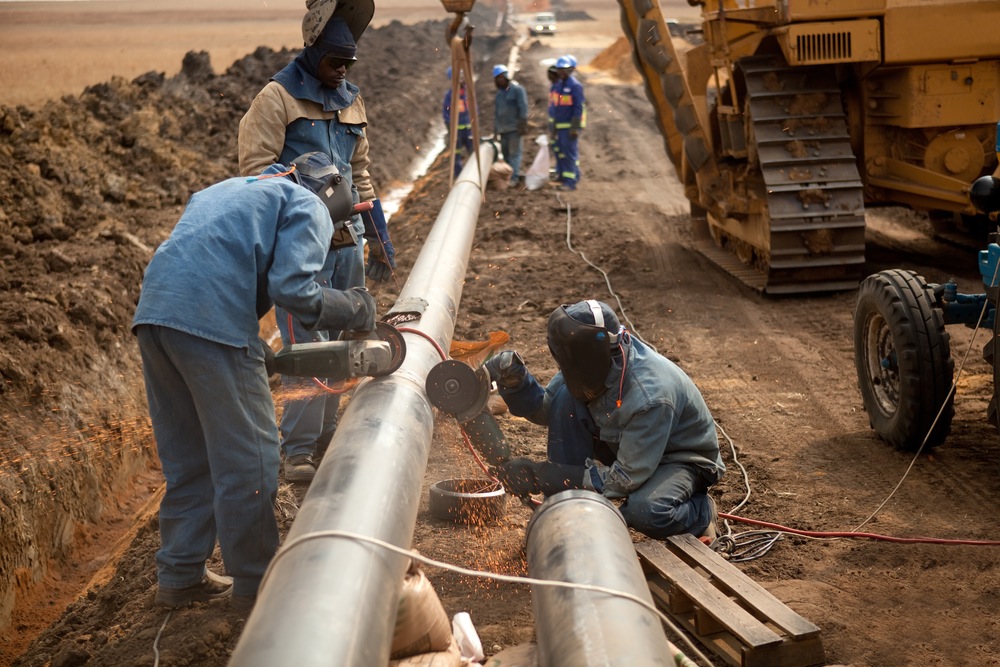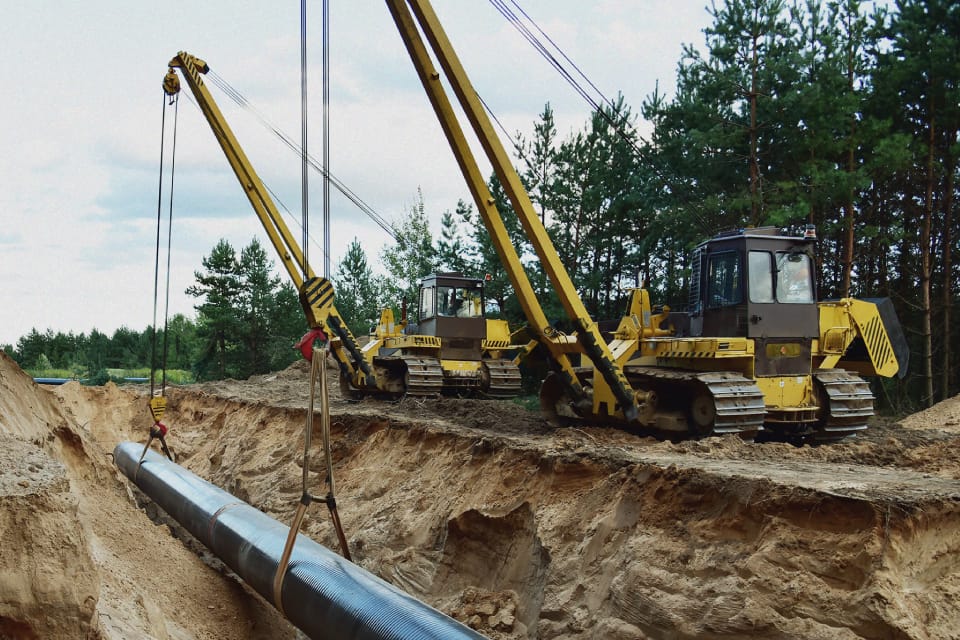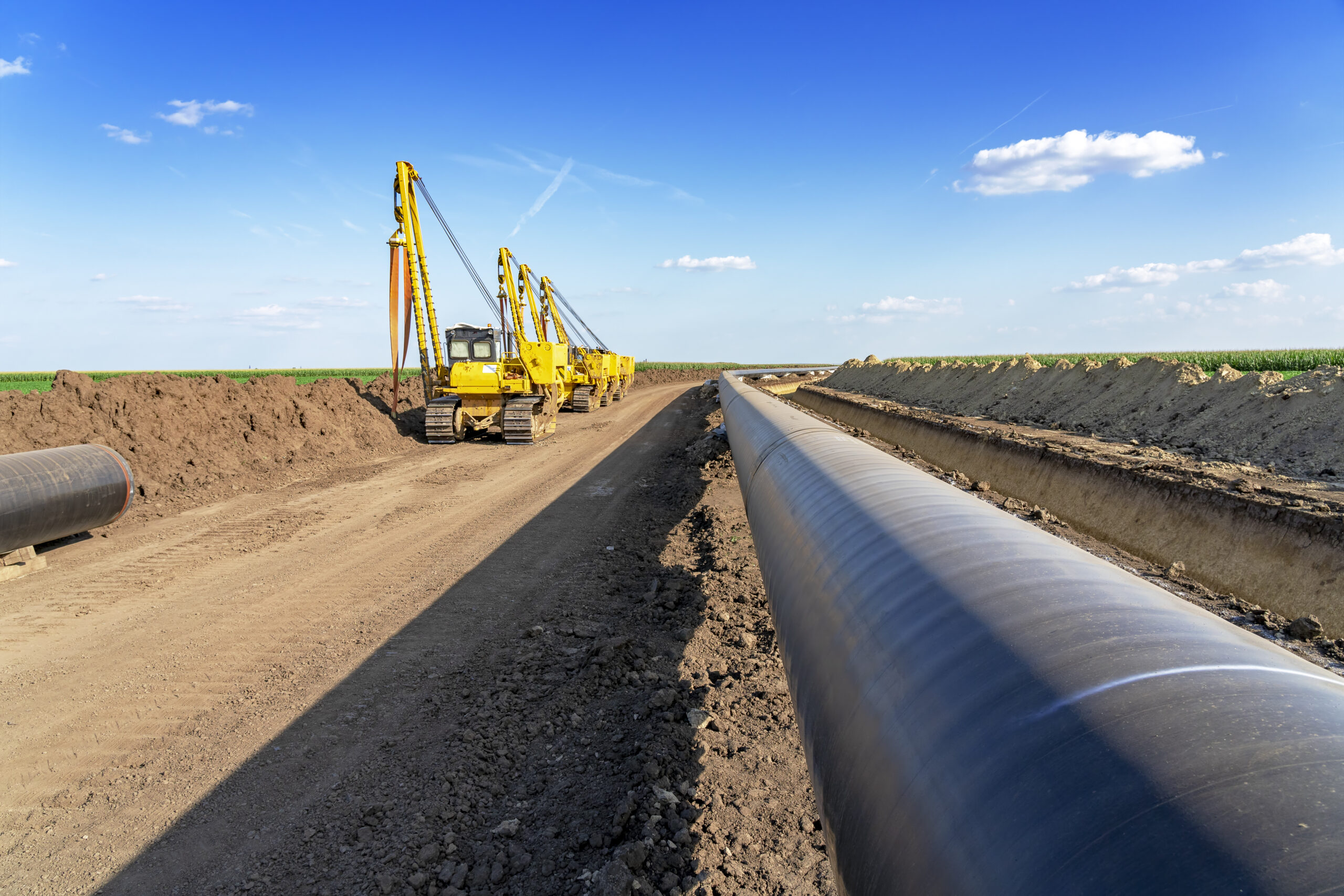Why Pipeline Construction Is Necessary for Energy Infrastructure Advancement
Pipeline construction plays a critical function in the development of energy framework, serving as the backbone for the transportation of important sources like oil and natural gas. This complex network not only assists in effective distribution but additionally reinforces financial development via job creation and local financial investment. Additionally, advancements in security technologies are attending to environmental problems, positioning pipelines as a foundation of lasting power techniques. The intricacies surrounding pipeline projects raise critical inquiries regarding governing frameworks and their long-lasting effect on neighborhoods and ecosystems. Discovering these measurements reveals a complex narrative that necessitates cautious factor to consider.
Function of Pipelines in Power Supply
The vital function of pipelines in energy supply can not be overemphasized, as they work as the backbone of contemporary energy facilities. Pipelines are essential for the reliable transport of numerous forms of energy, consisting of oil, all-natural gas, and fine-tuned products. They assist in the motion of these resources from removal sites to refineries and distribution centers, making certain that power gets to consumers in a timely manner.The construction of pipelines entails careful preparation and adherence to governing criteria, reflecting the complexities of the power market and ecological factors to consider. Effective pipe networks are developed to decrease transportation times, minimize prices, and improve safety, while likewise addressing possible environmental influences. The ability to deliver huge volumes of energy over cross countries makes pipelines a preferred selection for energy business aiming to enhance their supply chains.Moreover, pipelines add to power security by diversifying supply courses and resources. As worldwide energy demands rise and fall, pipelines allow areas to gain access to different power supplies, mitigating threats connected with reliance on solitary resources. This diversification cultivates affordable prices and maintains markets, which is important in a significantly interconnected international economy.In addition to their logistical benefits, pipelines support neighborhood economic situations by developing tasks throughout construction and upkeep phases. The presence of a robust pipe framework also draws in financial investments in energy tasks, even more enhancing regional advancement. Inevitably, pipelines are vital to the energy market, giving a reputable and efficient means of transport that underpins financial growth and sustainability.

Benefits of Effective Transportation
Effective transportation via pipeline systems offers substantial advantages, consisting of reduced transport costs and enhanced shipment speed. These advantages not just enhance the total business economics of energy circulation but additionally play an important duty in minimizing the ecological effect connected with energy transportation. As energy needs remain to rise, the importance of maximizing transportation techniques becomes increasingly obvious.

Reduced Transportation Expenses
Minimized transportation expenses stand for a remarkable advantage in the domain of energy facilities growth. The construction of pipelines provides a much more economically sensible ways of transferring power sources contrasted to alternate techniques such as trucking or rail transport. Pipelines, once developed, permit the continuous flow of oil, gas, and other items over fars away with marginal operational costs.One of the key reasons for reduced transportation costs is the effectiveness of pipeline systems. They can transfer large quantities of materials all at once, thereby spreading out repaired expenses over a better quantity of item. This bulk transport capacity significantly reduces the expense per unit, making power resources more budget friendly for consumers and businesses alike.Additionally, pipelines decrease the dangers and costs connected with handling and saving volatile materials. Unlike rail or road transportation, which can sustain delays and damage, pipelines give a much safer and a lot more regular technique of energy conveyance. This dependability enhances the financial expediency of power tasks, permitting for better rates structures in competitive markets. Eventually, lowered transportation costs foster an even more lasting power sector, promoting bigger access and motivating financial investment in further advancement.
Boosted Distribution Speed
Pipelines substantially enhance delivery rate in power transport, supplying a vital benefit over traditional methods such as trucking or rail systems. The continual circulation of materials through pipelines permits a steady and reliable transportation procedure, decreasing hold-ups connected with loading and unloading. This continuous motion is specifically necessary for power resources, where need can vary rapidly.Moreover, pipelines can operate around the clock, untouched by web traffic conditions or weather-related disruptions that can impede roadway or rail transportation. This integrity assures that power items get to customers swiftly, supporting operational requirements and boosting economic security. In addition, the scalability of pipeline systems facilitates the handling of huge quantities of energy, which is important for fulfilling the expanding requirements of industries and property sectors.Furthermore, the combination of sophisticated monitoring and control modern technologies in pipe systems boosts the distribution process. These technologies enable real-time monitoring of circulation rates and system stress, ensuring that any potential problems are addressed promptly. On the whole, the improved delivery speed offered by pipelines is a substantial consider optimizing energy facilities and guaranteeing that supply chains continue to be robust and responsive to market demands.
Environmental Effect Factors To Consider
The benefits of quick energy transportation expand past logistical advantages; they also incorporate substantial environmental factors to consider. Reliable pipeline systems permit the transportation of energy sources with minimal disruption to communities compared to alternate approaches such as truck or rail transportation. Pipelines can help with the motion of oil, gas, and various other materials in a highly concentrated way, which minimizes the carbon impact related to energy distribution.Moreover, pipelines are made with sophisticated safety and surveillance modern technologies that greatly lower the threat of spills and leakages. An effective pipe facilities minimizes the need for frequent transportation tasks, which can bring about decreased greenhouse gas exhausts with time (Midland Pipeline Construction Authority). Likewise, the capability to carry energy resources straight to consumers decreases reliance on more contaminating transportation methods, even more benefiting air quality.In addition, tactical pipe positioning can aid protect sensitive environments by following existing corridors, thereby lowering the influence on wild animals and all-natural landscapes. Overall, the construction of pipelines not just supports power framework advancement but likewise supplies an environmentally liable methods of delivering power, adding to a much more sustainable future
Economic Impact of Pipeline Projects
The financial impact of pipe jobs extends beyond mere transportation efficiency, considerably affecting local and local economic climates. These campaigns develop job possibilities during both construction and recurring operations, fostering community advancement (Pipeline Construction Excellence). Furthermore, the stimulation of financial growth via enhanced investment and infrastructure enhancement is a key benefit of pipeline construction
Work Production Opportunities
While energy infrastructure projects usually deal with analysis, they provide substantial job production chances that can favorably affect regional economic situations. Pipeline construction jobs call for a varied array of skilled labor, consisting of designers, task managers, and specialized specialists, in addition to inexperienced laborers for numerous duties. This complex here are the findings demand for labor can result in find more information the production of hundreds of work during the construction stage and typically leads to lasting job opportunity once the framework is operational.In addition to route employment, pipe tasks boost neighborhood economies by generating supplementary task opportunities in fields such as transport, production, and hospitality. Local companies take advantage of enhanced demand for products and services, adding to total financial health and wellness. Furthermore, the influx of workers can lead to raised tax obligation incomes for regional governments, which can be reinvested in community solutions and infrastructure.Moreover, pipe construction projects often focus on working with neighborhood workers, promoting a feeling of neighborhood financial investment and support. By linking the void between power supply and demand, these tasks not only enhance power safety and security however likewise work as drivers for financial advancement, strengthening the relevance of pipe construction in task production efforts.
Financial Growth Stimulation
Pipeline tasks work as a powerful financial development stimulus, driving significant investments right into regional and local economic situations. The construction and operation of pipelines produce a surge impact, generating need for products, tools, and services (Texas Pipeline Construction Excellence). This influx of resources supports neighborhood organizations, from manufacturing to hospitality, promoting a durable financial environment.Moreover, these jobs create significant tax revenues for districts and states, which can be reinvested in civil services, facilities improvements, and area development initiatives. The financial advantages expand past prompt work development, as experienced labor is typically required for recurring upkeep and operations, guaranteeing long-term work opportunities.Additionally, the enhanced energy facilities helps with the reliable transportation of resources, potentially lowering energy costs for consumers and businesses alike. By improving energy access, pipelines can draw in brand-new industries and promote growth in existing sectors, adding to general financial diversity
Ecological Factors To Consider and Technologies
Harmonizing energy needs with eco-friendly integrity becomes increasingly important as pipe construction increases. The pursuit of efficient power transport need to represent ecological impacts, necessitating cutting-edge practices and technologies that decrease eco-friendly disruption. Modern pipeline jobs are significantly integrating innovative environmental assessments at every phase, guaranteeing that potential threats are recognized and mitigated early in the preparation process.One significant advancement in this field is the adoption of trenchless modern technology, which enables the installment of pipelines without substantial surface area interruption. This method reduces environment fragmentation, preserves existing communities, and decreases the carbon footprint linked with conventional excavation strategies. Additionally, real-time surveillance systems furnished with sensing units enable operators to discover leakages or environmental modifications swiftly, consequently facilitating punctual reactions to potential hazards.Moreover, the unification of eco friendly materials review and construction strategies is gaining grip. Biodegradable boring fluids and corrosion-resistant coverings can considerably reduce the environmental footprint of pipeline projects. Companies are additionally committing to restoring habitats post-construction, using indigenous plant types to assist in community recovery.Collaboration with environmental agencies and local neighborhoods is vital - Pipeline Construction Excellence. Engaging stakeholders in the decision-making process promotes transparency and promotes sustainable methods, ensuring that energy framework advancement lines up with environmental stewardship
Challenges in Pipeline Construction
In the middle of the growing demand for energy facilities, numerous obstacles make complex the construction of pipelines. One of the main concerns is the geographical variability of pipeline courses, which can traverse diverse landscapes, consisting of hills, rivers, and urban locations. Each setting needs tailored design remedies to resolve ecological security, geological security, and logistical constraints.Additionally, the general public understanding of pipeline projects typically positions a considerable hurdle. Local areas might reveal problems regarding prospective environmental influences, safety threats, and interruption throughout construction. This opposition can lead to hold-ups, enhanced costs, and the requirement for substantial community interaction methods to foster acceptance.Moreover, labor scarcities in proficient professions even more complicate pipe construction initiatives. As the need for energy infrastructure expands, the availability of experienced workers decreases, which can bring about job hold-ups and boosted labor costs. The pipeline market have to invest in workforce advancement campaigns to cultivate a skilled labor force efficient in fulfilling the evolving demands.Safety stays a critical worry throughout the construction procedure. The sector encounters the challenge of ensuring that all security protocols are followed, as also small lapses can cause significant crashes. This demands rigorous training and oversight to preserve functional integrity.Lastly, varying material expenses can influence task budget plans and timelines. The demand for top notch materials, paired with market volatility, calls for mindful economic planning and threat mitigation methods to maintain tasks on the right track. Addressing these obstacles is crucial for the effective and reliable construction of pipelines as component of a robust energy facilities.
Governing Framework and Compliance
The regulatory framework governing pipeline construction is complex and diverse, needing conformity with a variety of government, state, and neighborhood policies. At the government degree, companies such as the Federal Power Regulatory Commission (FERC) and the Pipeline and Hazardous Products Security Administration (PHMSA) play important roles in overseeing pipe projects. FERC controls the transportation of gas and oil, authorizing jobs based on financial demand and public rate of interest, while PHMSA concentrates on security requirements and the stability of pipeline operations.State guidelines can differ substantially, with specific states enforcing their very own permitting procedures, safety guidelines, and environmental assessments. For example, state utility compensations may need extra analysis of suggested routes to ensure very little disruption to areas and ecosystems. Conformity with the National Environmental Policy Act (NEPA) is likewise necessary, mandating thorough ecological effect assessments prior to job approval.Local regulations might additionally make complex the compliance landscape, as communities typically have details zoning laws, land use regulations, and area engagement demands. Engaging with local stakeholders is not only a regulatory necessity but likewise a best practice to help with smoother job execution.Moreover, the regulatory landscape is continually developing, influenced by public belief, technological innovations, and ecological plans, demanding constant caution from pipeline operators. Steering with this complex regulative structure is essential for verifying that pipeline construction tasks are not only lawfully certified however also socially liable and eco lasting, thus adding to the general efficiency of energy facilities advancement.
Future Patterns in Pipeline Framework
A significant transformation is underway in pipe framework, driven by advancements in technology, advancing power needs, and boosting ecological consciousness. As the global power landscape shifts towards renewable resources, pipe systems are adjusting to accommodate diverse power types, including all-natural gas and biofuels, while likewise incorporating much more sophisticated surveillance and security technologies.One noteworthy pattern is the unification of digital services, such as Web of Things (IoT) gadgets and expert system (AI), which enhance real-time surveillance and predictive upkeep capabilities. These developments not only enhance operational effectiveness yet additionally significantly reduce the danger of leaks and crashes, guaranteeing greater ecological defense. Furthermore, using innovative materials, such as composite pipelines, is gaining grip due to their longevity and resistance to corrosion, additional prolonging the lifespan of pipeline systems.Moreover, the focus on sustainability is motivating the development of greener construction methods. Methods such as trenchless modern technology minimize land disruption and ecological impact, lining up pipe jobs with contemporary ecological requirements. In enhancement, governing frameworks are developing to advertise transparency and accountability in pipe procedures, guaranteeing stakeholders are much more notified about prospective threats and advantages.
Often Asked Concerns
Just How Do Pipelines Contrast to Other Transport Techniques for Energy Resources?
Pipelines provide a cost-efficient, reliable, and eco-friendly method for transporting energy sources contrasted to alternatives like vehicles and trains, which typically sustain greater operational expenses, higher land usage, and boosted greenhouse gas emissions. - Pipeline Construction Authority

What Materials Are Typically Made Use Of in Pipeline Construction?
Typical materials used in pipeline construction consist of carbon steel, stainless-steel, and plastic compounds. These products are selected for their stamina, resilience, corrosion resistance, and viability for different environmental problems and kinds of transported energy sources.

For how long Does It Generally Require To Construct a Pipeline?
The period for pipeline construction varies considerably based upon elements such as length, terrain, and governing requirements. Usually, it can vary from several months to a few years, depending on task complexity and environmental factors to consider.
That Are the Secret Stakeholders in Pipeline Projects?
Key stakeholders in pipeline jobs consist of federal government agencies, governing bodies, energy companies, environmental companies, neighborhood areas, and landowners - Midland Pipeline Construction Authority. Each group plays a vital duty in planning, permitting, construction, and continuous procedures of pipeline facilities
What Are the Key Precaution Throughout Pipeline Construction?
Throughout pipe construction, main precaution include strenuous site evaluations, adherence to governing requirements, comprehensive training for workers, making use of personal protective equipment, and constant surveillance of ecological problems to mitigate dangers and ensure functional safety.
Comments on “Community Growth Through Pipeline Construction Authority”